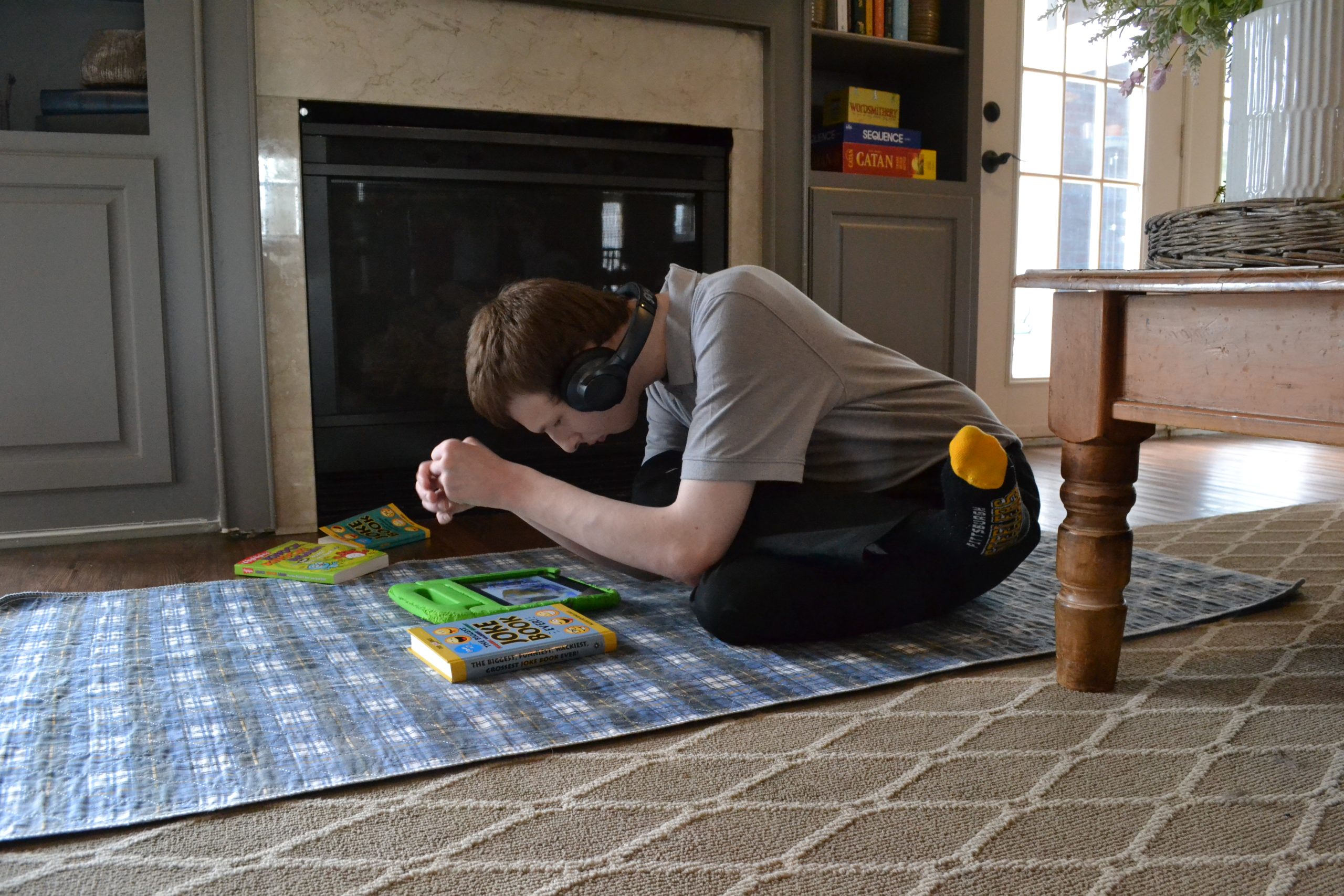Mississippi Today
Attorney General investigating provider fraud in Medicaid waiver

Attorney General investigating provider fraud in Medicaid waiver
The Mississippi Attorney General’s Office is investigating whether a behavioral therapist provider bilked Medicaid under a special program for people with intellectual and developmental disabilities.
Natalie Gunnells, the mother of a 23-year-old Medicaid recipient named Patrick, first noticed a billing discrepancy in early 2022 after requesting to see records from the Mississippi Department of Mental Health.
The Department of Mental Health administers the program, called the Medicaid IDD waiver, but the Mississippi Division of Medicaid pays for it.
Under the waiver, Patrick is eligible to receive over 200 hours of services each month, but in the last several years, he’s received just a handful of hours, if not zero.
That hasn’t stopped Mississippi Behavioral Services, a clinic in Southaven owned by Vargas Clark, from billing Medicaid for thousands of dollars worth of therapy for Patrick, records obtained by Mississippi Today show.
Clark, who has not been charged with a crime, said he was unaware of the investigation and did not return several follow up calls and texts from Mississippi Today. Gunnells estimates Medicaid reimbursed the company for $42,000 worth of services that her son didn’t receive from 2020 to 2022. She says disregard at the mental health and Medicaid agencies allowed this to continue unnoticed.
“We provide services as written for the service authorization,” Clark said. “Now there may be individuals that are authorized for, let’s say, 30 hours. We may be providing 10. But we only bill services for services that are actually rendered.”
Mississippi spends about $125 million annually on the waiver program, an average reimbursement of about $45,000 worth of services for each person.
Several parents who spoke to Mississippi Today and voiced their concerns at a recent public hearing want to know where all that money is going. It’s hard for them to believe that much care is being delivered, considering the worker shortage that has left them without any help for their adult children.
And they’re worried that a lack of oversight in the program could mean taxpayer dollars are flying out the door of Medicaid while some of the state’s most vulnerable residents go without services.
“There’s no telling how much fraud is occurring,” Gunnells said.
One of those parents is Deb Giles, who has been unable to find a specialist to provide the speech therapy her son is qualified to receive. But at the hearing in February, Giles focused her concerns on the accountability within the program.
“My recommendation for the Department of Mental Health is to provide the recipients with reports on audits of the providers and to provide more audits,” Giles said. “I’ve run into roadblocks, and not enough information as to how these providers are being audited. Some are not providing the services that they’re being paid for, or reimbursed for, and I would like to see more information for Mississippi on how these providers are being audited. And also I’d like to be able to assess the audits, to read throughout the state of Mississippi what the providers are providing for the recipients.”
Giles told Mississippi Today she wasn’t alleging a specific instance of fraud, but that the waiver program doesn’t collect enough information from providers to ensure they’re performing all the functions they’re supposed to.
The Department of Mental Health’s primary role in the IDD waiver is to provide clients with support coordinators from the agency’s regional IDD centers. The support coordinator’s job is to consult with the parent or guardian of an individual on the waiver to ensure they are receiving the services outlined in the support plan they create together. For years, Gunnells said her support coordinator did not review service reports with her. Several call logs Mississippi Today reviewed confirmed that this wasn’t happening.
“It seems every standard put in place to ensure appropriate care for P (Patrick) was totally ignored from the Support Coordinator to all his superiors charged with ensuring the documents such as Quarterly Reports, Behavior Support Plan and required IDD service notes were submitted on time and accurate,” Gunnells wrote in a timeline of the alleged fraud. “They were so negligent that any agency billing Medicaid, that wanted to commit fraud, could without detection.”

Department of Mental Health Director Wendy Bailey said the agency conducted its own internal investigation into the matter and referred it to Medicaid. She said DMH is providing additional training to support coordinators and looking at ways to improve its site visit process at the regional centers. The central office reviews a sample of support coordination records monthly.
The state Medicaid agency is in the process of renewing its application to the federal government for the waiver.
“While we don’t have evidence to believe this type of provider fraud is widespread, we still have to be open to new ways of preventing fraud and be aggressive in rooting it out,” Medicaid spokesperson Matt Westerfield said in a statement to Mississippi Today. “This year, the Division plans to implement an electronic system for the ID/DD waiver that documents the time certain ID/DD services begin and end.”
The Medicaid statement also encouraged anybody who suspects Medicaid fraud to notify the agency here.
The Attorney General’s Office, which began its investigation more than six months ago, did not respond to several requests for comment for this story.
This article first appeared on Mississippi Today and is republished here under a Creative Commons license.
Did you miss our previous article…
https://www.biloxinewsevents.com/on-this-day-in-1909/
Mississippi Today
1964: Mississippi Freedom Democratic Party was formed
April 26, 1964

Civil rights activists started the Mississippi Freedom Democratic Party to challenge the state’s all-white regular delegation to the Democratic National Convention.
The regulars had already adopted this resolution: “We oppose, condemn and deplore the Civil Rights Act of 1964 … We believe in separation of the races in all phases of our society. It is our belief that the separation of the races is necessary for the peace and tranquility of all the people of Mississippi, and the continuing good relationship which has existed over the years.”
In reality, Black Mississippians had been victims of intimidation, harassment and violence for daring to try and vote as well as laws passed to disenfranchise them. As a result, by 1964, only 6% of Black Mississippians were permitted to vote. A year earlier, activists had run a mock election in which thousands of Black Mississippians showed they would vote if given an opportunity.
In August 1964, the Freedom Party decided to challenge the all-white delegation, saying they had been illegally elected in a segregated process and had no intention of supporting President Lyndon B. Johnson in the November election.
The prediction proved true, with white Mississippi Democrats overwhelmingly supporting Republican candidate Barry Goldwater, who opposed the Civil Rights Act. While the activists fell short of replacing the regulars, their courageous stand led to changes in both parties.
This article first appeared on Mississippi Today and is republished here under a Creative Commons Attribution-NoDerivatives 4.0 International License.![]()
Mississippi Today
Mississippi River flooding Vicksburg, expected to crest on Monday
Warren County Emergency Management Director John Elfer said Friday floodwaters from the Mississippi River, which have reached homes in and around Vicksburg, will likely persist until early May. Elfer estimated there areabout 15 to 20 roads underwater in the area.
“We’re about half a foot (on the river gauge) from a major flood,” he said. “But we don’t think it’s going to be like in 2011, so we can kind of manage this.”
The National Weather projects the river to crest at 49.5 feet on Monday, making it the highest peak at the Vicksburg gauge since 2020. Elfer said some residents in north Vicksburg — including at the Ford Subdivision as well as near Chickasaw Road and Hutson Street — are having to take boats to get home, adding that those who live on the unprotected side of the levee are generally prepared for flooding.



“There are a few (inundated homes), but we’ve mitigated a lot of them,” he said. “Some of the structures have been torn down or raised. There are a few people that still live on the wet side of the levee, but they kind of know what to expect. So we’re not too concerned with that.”
The river first reached flood stage in the city — 43 feet — on April 14. State officials closed Highway 465, which connects the Eagle Lake community just north of Vicksburg to Highway 61, last Friday.

Elfer said the areas impacted are mostly residential and he didn’t believe any businesses have been affected, emphasizing that downtown Vicksburg is still safe for visitors. He said Warren County has worked with the U.S. Army Corps of Engineers and the Mississippi Emergency Management Agency to secure pumps and barriers.
“Everybody thus far has been very cooperative,” he said. “We continue to tell people stay out of the flood areas, don’t drive around barricades and don’t drive around road close signs. Not only is it illegal, it’s dangerous.”
NWS projects the river to stay at flood stage in Vicksburg until May 6. The river reached its record crest of 57.1 feet in 2011.




This article first appeared on Mississippi Today and is republished here under a Creative Commons Attribution-NoDerivatives 4.0 International License.![]()
Mississippi Today
With domestic violence law, victims ‘will be a number with a purpose,’ mother says
Joslin Napier. Carlos Collins. Bailey Mae Reed.
They are among Mississippi domestic violence homicide victims whose family members carried their photos as the governor signed a bill that will establish a board to study such deaths and how to prevent them.
Tara Gandy, who lost her daughter Napier in Waynesboro in 2022, said it’s a moment she plans to tell her 5-year-old grandson about when he is old enough. Napier’s presence, in spirit, at the bill signing can be another way for her grandson to feel proud of his mother.
“(The board) will allow for my daughter and those who have already lost their lives to domestic violence … to no longer be just a number,” Gandy said. “They will be a number with a purpose.”
Family members at the April 15 private bill signing included Ashla Hudson, whose son Collins, died last year in Jackson. Grandparents Mary and Charles Reed and brother Colby Kernell attended the event in honor of Bailey Mae Reed, who died in Oxford in 2023.
Joining them were staff and board members from the Mississippi Coalition Against Domestic Violence, the statewide group that supports shelters and advocated for the passage of Senate Bill 2886 to form a Domestic Violence Facility Review Board.
The law will go into effect July 1, and the coalition hopes to partner with elected officials who will make recommendations for members to serve on the board. The coalition wants to see appointees who have frontline experience with domestic violence survivors, said Luis Montgomery, public policy specialist for the coalition.
A spokesperson from Gov. Tate Reeves’ office did not respond to a request for comment Friday.
Establishment of the board would make Mississippi the 45th state to review domestic violence fatalities.
Montgomery has worked on passing a review board bill since December 2023. After an unsuccessful effort in 2024, the coalition worked to build support and educate people about the need for such a board.
In the recent legislative session, there were House and Senate versions of the bill that unanimously passed their respective chambers. Authors of the bills are from both political parties.
The review board is tasked with reviewing a variety of documents to learn about the lead up and circumstances in which people died in domestic violence-related fatalities, near fatalities and suicides – records that can include police records, court documents, medical records and more.
From each review, trends will emerge and that information can be used for the board to make recommendations to lawmakers about how to prevent domestic violence deaths.
“This is coming at a really great time because we can really get proactive,” Montgomery said.
Without a board and data collection, advocates say it is difficult to know how many people have died or been injured in domestic-violence related incidents.
A Mississippi Today analysis found at least 300 people, including victims, abusers and collateral victims, died from domestic violence between 2020 and 2024. That analysis came from reviewing local news stories, the Gun Violence Archive, the National Gun Violence Memorial, law enforcement reports and court documents.
Some recent cases the board could review are the deaths of Collins, Napier and Reed.
In court records, prosecutors wrote that Napier, 24, faced increased violence after ending a relationship with Chance Fabian Jones. She took action, including purchasing a firearm and filing for a protective order against Jones.
Jones’s trial is set for May 12 in Wayne County. His indictment for capital murder came on the first anniversary of her death, according to court records.
Collins, 25, worked as a nurse and was from Yazoo City. His ex-boyfriend Marcus Johnson has been indicted for capital murder and shooting into Collins’ apartment. Family members say Collins had filed several restraining orders against Johnson.
Johnson was denied bond and remains in jail. His trial is scheduled for July 28 in Hinds County.
He was a Jackson police officer for eight months in 2013. Johnson was separated from the department pending disciplinary action leading up to immediate termination, but he resigned before he was fired, Jackson police confirmed to local media.
Reed, 21, was born and raised in Michigan and moved to Water Valley to live with her grandparents and help care for her cousin, according to her obituary.
Kylan Jacques Phillips was charged with first degree murder for beating Reed, according to court records. In February, the court ordered him to undergo a mental evaluation to determine if he is competent to stand trial, according to court documents.
At the bill signing, Gandy said it was bittersweet and an honor to meet the families of other domestic violence homicide victims.
“We were there knowing we are not alone, we can travel this road together and hopefully find ways to prevent and bring more awareness about domestic violence,” she said.
This article first appeared on Mississippi Today and is republished here under a Creative Commons Attribution-NoDerivatives 4.0 International License.
-

 News from the South - Florida News Feed6 days ago
News from the South - Florida News Feed6 days agoJim talks with Rep. Robert Andrade about his investigation into the Hope Florida Foundation
-

 News from the South - Alabama News Feed5 days ago
News from the South - Alabama News Feed5 days agoPrayer Vigil Held for Ronald Dumas Jr., Family Continues to Pray for His Return | April 21, 2025 | N
-

 Mississippi Today5 days ago
Mississippi Today5 days ago‘Trainwreck on the horizon’: The costly pains of Mississippi’s small water and sewer systems
-

 News from the South - Texas News Feed5 days ago
News from the South - Texas News Feed5 days agoMeteorologist Chita Craft is tracking a Severe Thunderstorm Warning that's in effect now
-

 News from the South - Florida News Feed4 days ago
News from the South - Florida News Feed4 days agoTrump touts manufacturing while undercutting state efforts to help factories
-

 News from the South - Virginia News Feed5 days ago
News from the South - Virginia News Feed5 days agoTaking video of military bases using drones could be outlawed | Virginia
-

 News from the South - Texas News Feed7 days ago
News from the South - Texas News Feed7 days agoNo. 3 Texas walks off No. 9 LSU again to capture crucial SEC softball series
-

 News from the South - Florida News Feed4 days ago
News from the South - Florida News Feed4 days agoFederal report due on Lumbee Tribe of North Carolina’s path to recognition as a tribal nation














































